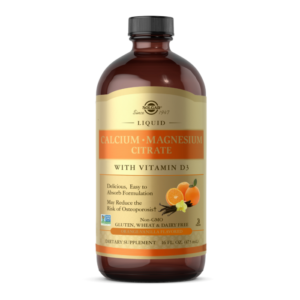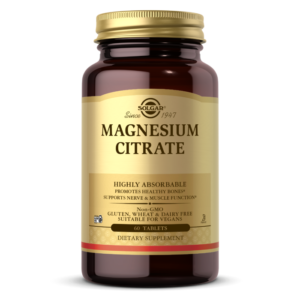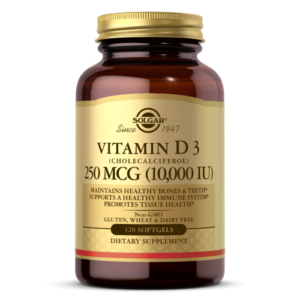Key Takeaways:
- Peak bone mass develops during your years of rapid growth. However, after age 40, your bone mass slowly begins to decline.
- Calcium, magnesium, and vitamin D3 are essential for bone health. Performing strength training exercises can also help promote healthy bones.
As a child, you may have been told you need to eat healthy foods or drink lots of milk so that you could “grow big and strong.” But as a fully grown adult, when was the last time you thought about your bone health?
Your bones are your body’s foundation. They provide the skeleton around which your muscles develop, and they allow you to exercise, stretch, and do the things you love.
However, your bones change as you age, and taking care of your bone health is just important as it was when you were young.
Let’s look at how bones change with age and what you can do to keep your bones as healthy as possible.
What is peak bone mass?
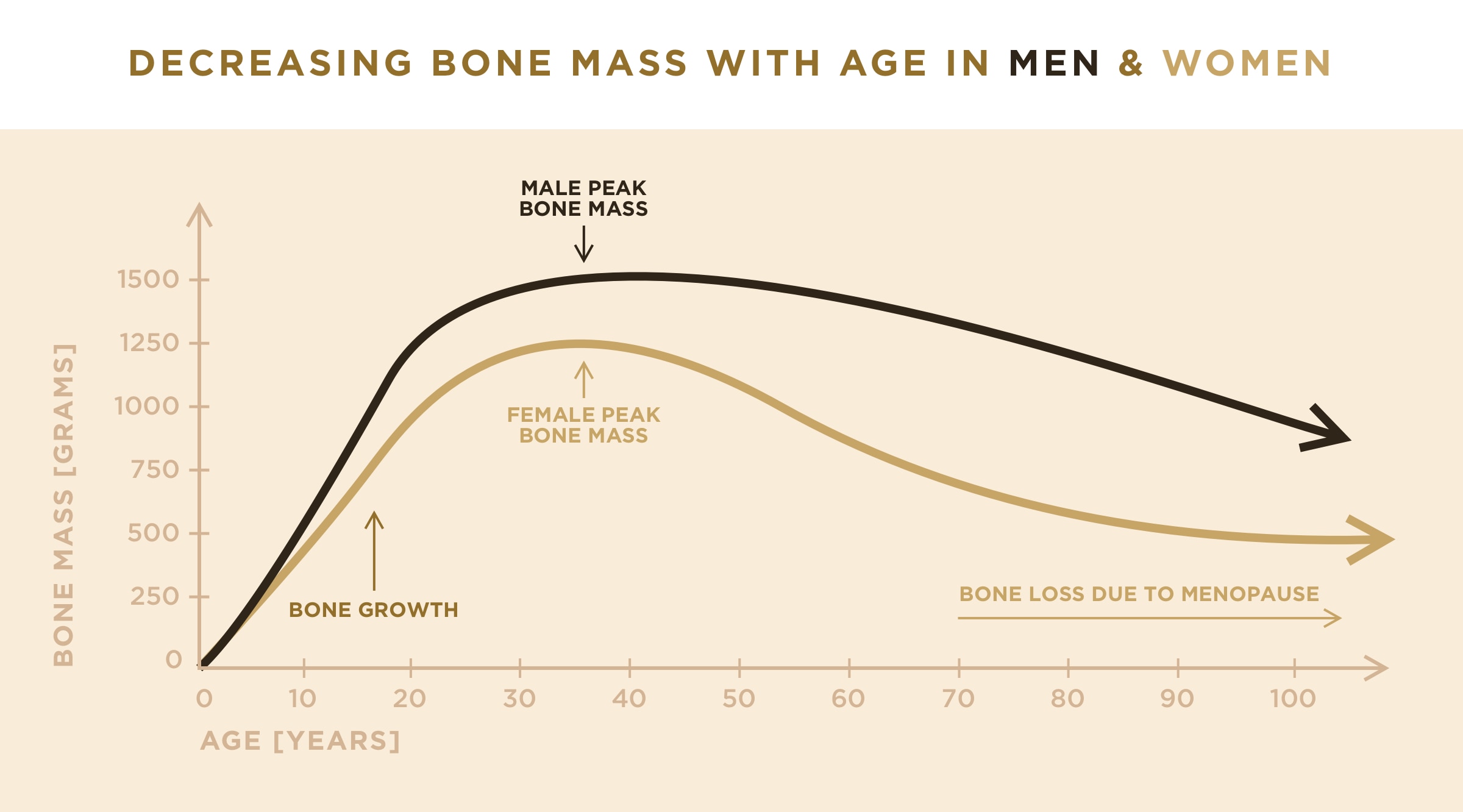
Your maximum bone size and strength is called peak bone mass. Genes play a large role in how much peak bone you have; for example, the actual size and structure of a person’s skeleton is determined by genetic factors. However, lifestyle factors such as diet and exercise can influence whether or not you reach your full bone mass potential.1
There is a limited time you can influence your peak bone mass. The best time is during years of rapid growth: childhood, adolescence, and early adulthood. Just as healthy lifestyle choices can positively affect your peak bone mass development, negative choices such as smoking, physical inactivity, or poor nutrition can negatively affect your bone development.2
Most people reach their peak bone mass between the ages of 25 and 30. Around 40 or 50, however, bone mass slowly decreases.3
Bone health and aging
Throughout your life, your body is continually engaging in a process called remodeling, during which old bone is removed and replaced with new, fresh bone. Up until about the age of 40, all bone is replaced. After age 40, however, less bone is replaced, which can cause the bones to become weaker.4
During this time, lifestyle choices that promote bone health are essential. Keep reading to learn a few ways you can help keep your bones healthy and strong, no matter your age.
4 ways to promote healthier bones
1. Make sure you’re getting adequate calcium
Calcium is the main mineral found in bones, and it is the most important mineral for bone health. Because old bone tissue is constantly being broken down and rebuilt with new bone tissue, it’s important to consume calcium daily to help maintain bone strength.*
If you do not have enough calcium in your diet, calcium is removed from where it is stored in the bones. It’s important to ensure that you are getting an adequate intake of calcium in the diet to help continue supporting strong bones.*5
Calcium is not made in the body and must be obtained from the foods you eat. Milk, yogurt, cheese, and other dairy products are the best sources of calcium. Other great sources include green leafy vegetables, sardines, tofu, breads and grains, and calcium-fortified foods and beverages.
Calcium absorption
Being a large mineral, calcium is not always easy to absorb. There are also factors that can affect calcium absorption. For example, phytates (phytic acid) found in whole grains and legumes can decrease calcium absorption. Inadequate vitamin D status might also affect calcium absorption.
Some foods have higher calcium bioavailability than others, meaning it is easier for your body to absorb. Having adequate levels of vitamin D and magnesium is essential for the absorption of calcium. This is why many supplements offer calcium, vitamin D, and magnesium in one supplement.6
Calcium supplements
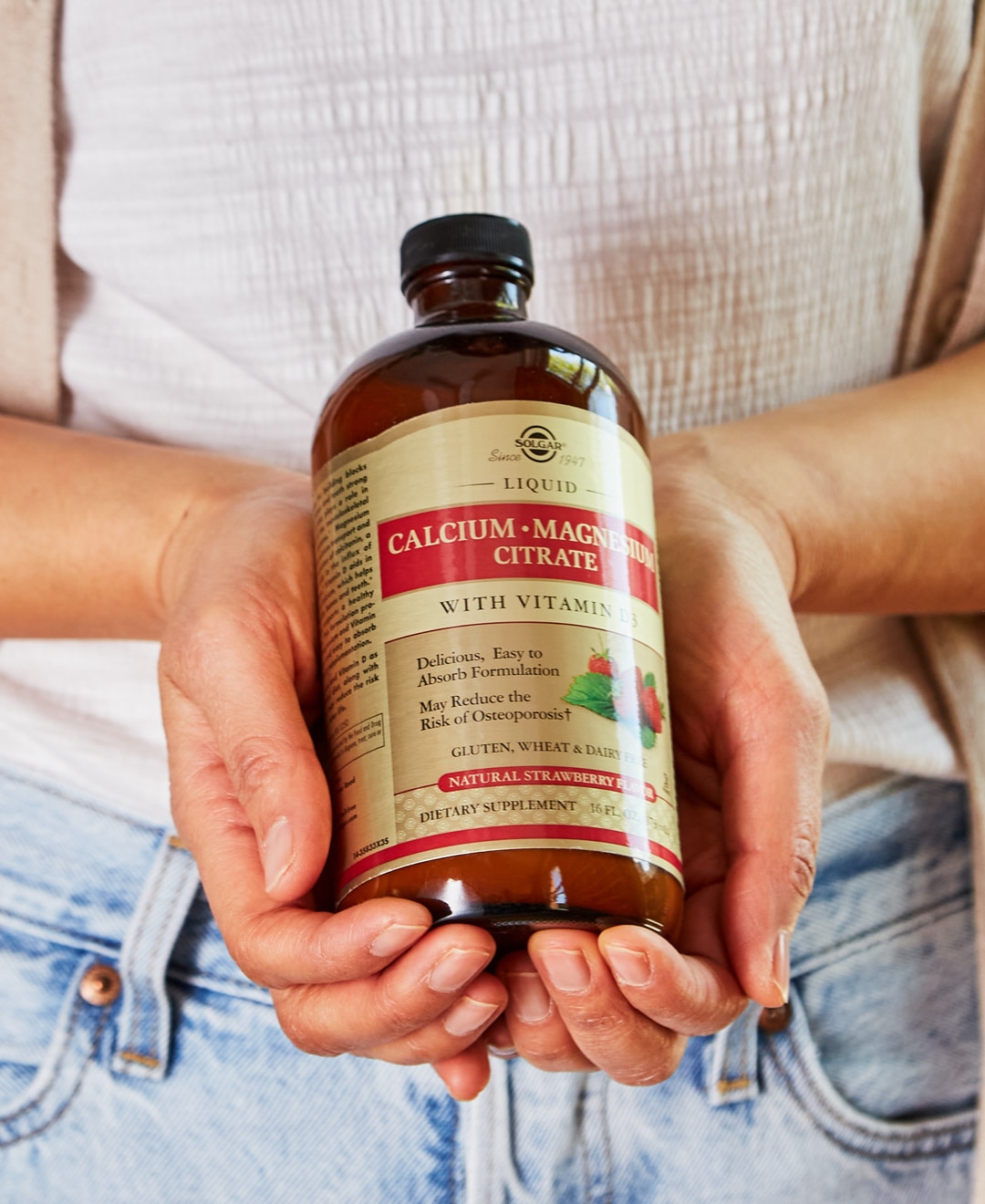
Solgar® Liquid Calcium Magnesium Citrate with Vitamin D3
Solgar Liquid Calcium Magnesium with Vitamin D3 offers three nutrients for supporting bone health in one easy, liquid supplement. The liquid form makes it easy to take, and each serving supports strong bones and teeth, a healthy immune system, and proper nerve and muscle function.* Available in strawberry, blueberry, and orange-vanilla flavors.
Solgar® Calcium Magnesium Plus Zinc
Calcium, magnesium, and zinc are all important for healthy bones.* This formula offers all three and supports strong bones and teeth, a healthy immune system, and more.* And, it’s non-GMO, vegan, gluten-free, dairy-free, kosher, and halal!
2. Take a vitamin D3 supplement
Like calcium, vitamin D is also important for maintaining strong and healthy bones.* Vitamin D is essential for the absorption of calcium from food or supplements.*
Vitamin D is often referred to as the “sunshine vitamin” because the majority of vitamin D in the body is sourced through synthesis upon exposure to the sun’s UV rays. However, if you spend a lot of time indoors or are in a less sunny climate, you may not be getting adequate vitamin D. Even wearing sunscreen – something you should always do outdoors – can inhibit your body’s ability to absorb vitamin D from the sun.
Taking a vitamin D supplement is the easiest way to ensure you are getting your daily dose of vitamin D in a form that your body can readily absorb.
Vitamin D3 supplement
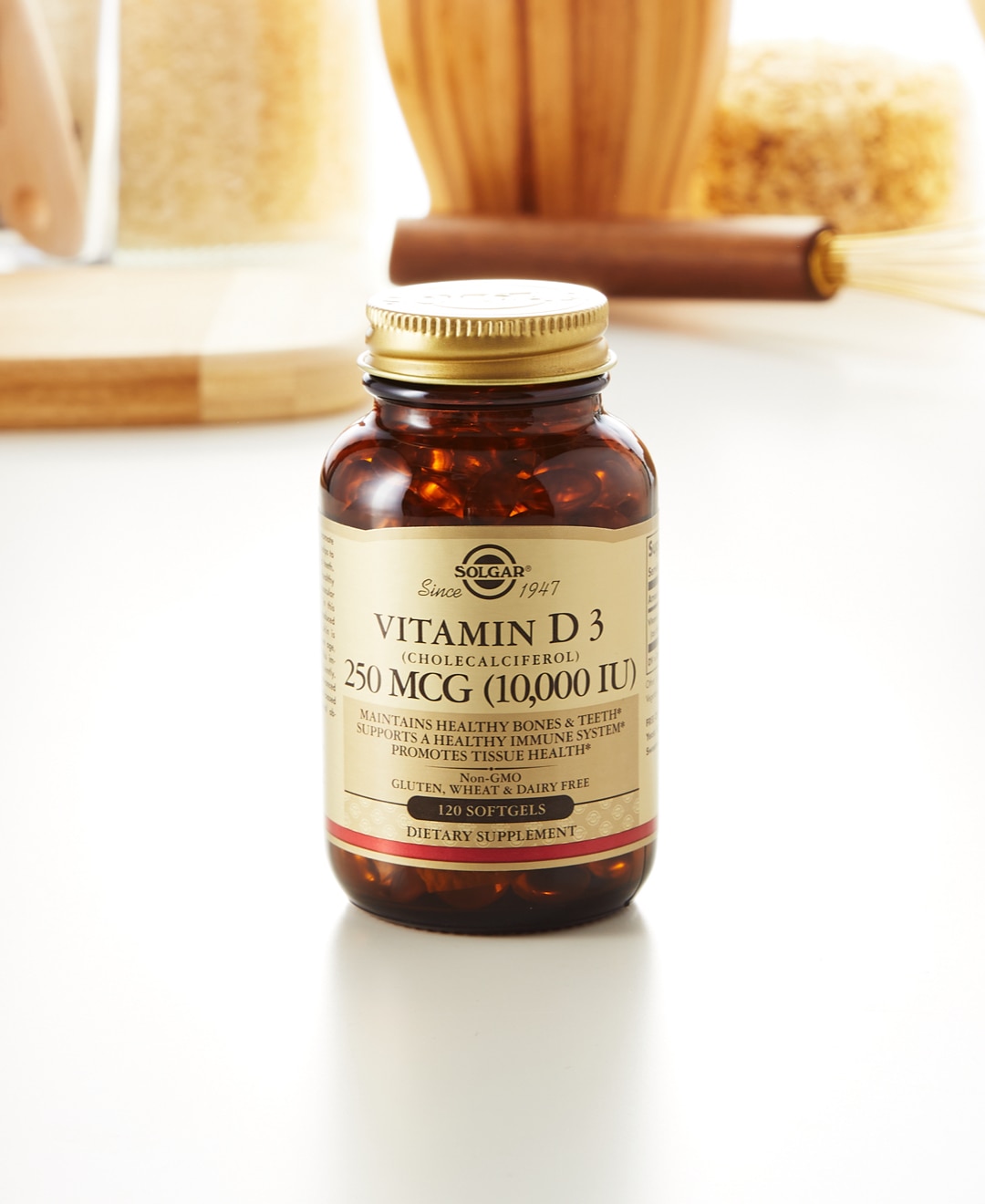
One Solgar® Vitamin D3 softgel taken daily helps maintain strong bones and teeth and a healthy immune system.* Since vitamin D3 is fat-soluble, our convenient, oil-based softgels are easy to swallow and absorb. And, they’re non-GMO, gluten-free, and dairy-free.
3. Eat magnesium-rich foods
Magnesium is an essential mineral involved in over 300 reactions in the body. It is also crucial for bone health, with about 60% of this mineral being found in bone tissue.
Magnesium plays an important role in the absorption and metabolism of calcium, which is why you may often find it in calcium supplements.* People with higher intakes of magnesium have been found to have higher bone density, which is important in maintaining overall bone health.7
Rich sources of magnesium include green leafy vegetables, nuts, seeds, dry beans, whole grains, and more. However, the easiest way to ensure you’re getting enough magnesium is to take a magnesium supplement.
Magnesium supplement
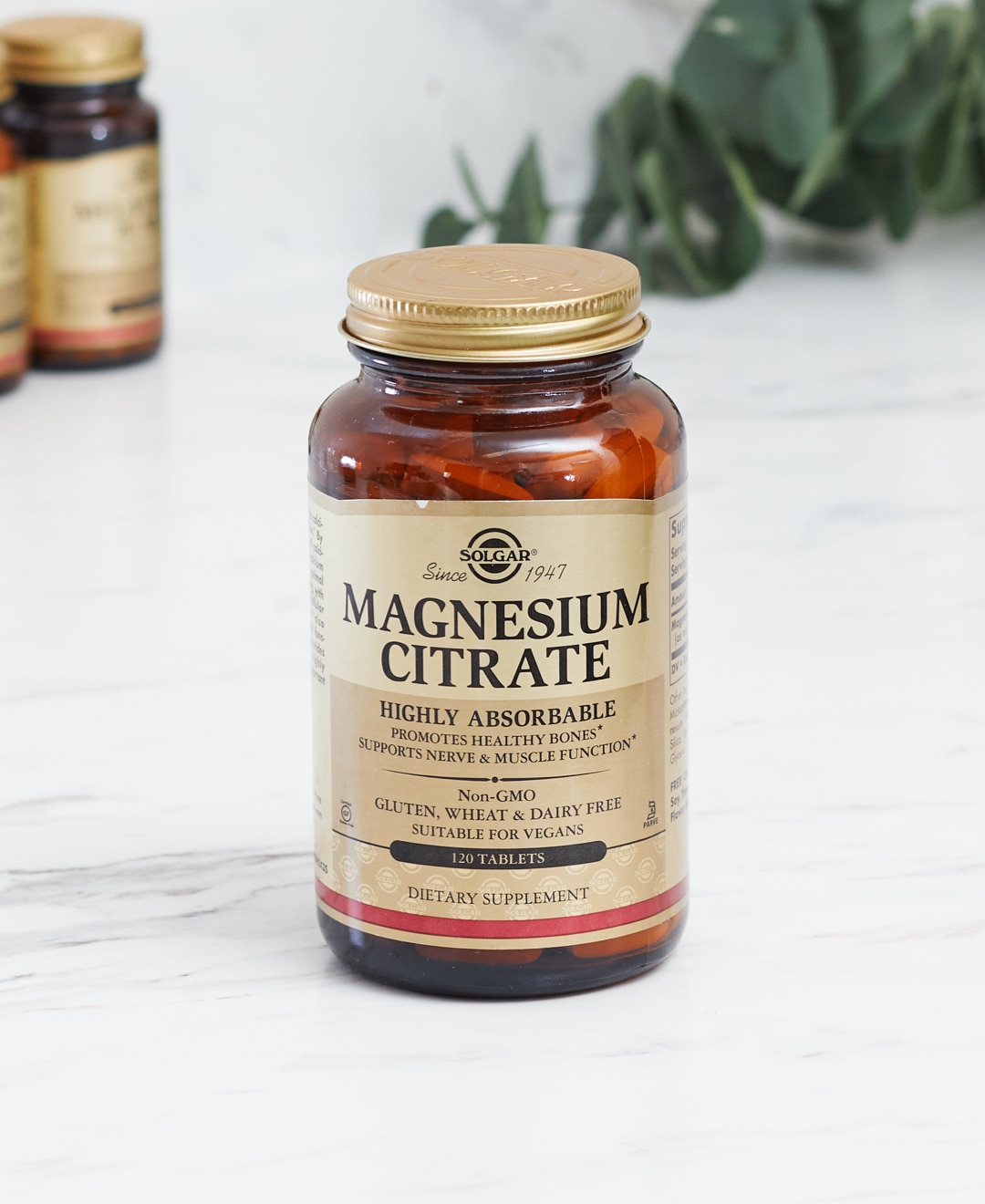
Solgar® Magnesium Citrate Tablets
Solgar® Magnesium Citrate helps support bone health, maintain proper muscle and nerve function, alleviate occasional anxiety and stress, and maintain cellular energy levels.* This formula uses a highly-absorbable form of magnesium so that your body gets as much out of it as possible. And, it’s non-GMO, vegan, gluten-free, dairy-free, and kosher!
4. Perform strength training and weight-bearing exercises
You may know that strength training – such as using weights, machines, or resistance bands – can help build muscle, but did you know that it can also help you build strong bones?
Studies have shown that strength training exercises can play a role in slowing bone loss and can even help build new bone. This is incredibly important in order to offset age-related declines in bone mass. Activities that put stress on bones, like in strength training, can nudge bone-forming cells into action. The stress that comes from pushing or tugging on bones, as in strength training, can result in stronger, denser bones.8 9
Make sure to consult your healthcare provider before implementing new exercises or workout practices into your routine.
GET THE LATEST UPDATES AND EXCLUSIVE DEALS WHEN YOU SIGN UP FOR OUR NEWSLETTER!
Bone health: the bottom line
Healthy bones help you continue doing what you love, even as you get older. Although bone density decreases with age, there are many things you can do to help promote healthy, strong bones, including paying attention to your calcium, vitamin D, and magnesium intake and performing strength training exercises.
For more trusted, science-backed health and wellness information delivered straight to your inbox, sign up for our email newsletter!
*These statements have not been evaluated by the Food and Drug Administration. These products are not intended to diagnose, treat, cure or prevent any disease.
The information provided on this site is intended for your general knowledge only and is not a substitute for professional medical advice or treatment for specific medical conditions. Always seek the advice of your physician or other qualified healthcare provider with any questions you may have regarding a medical condition. The information on this website is not intended to diagnose, treat, cure or prevent any disease. Never disregard medical advice or delay in seeking it because of something you have read on the Solgar® site.



